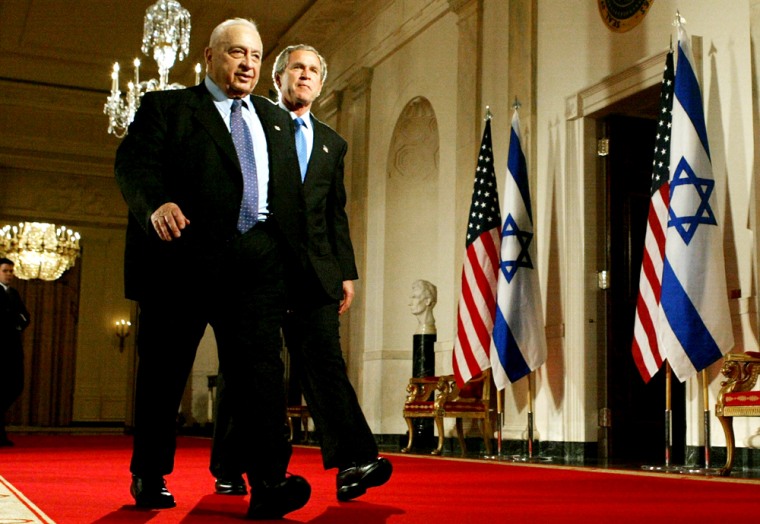President Bush's embrace yesterday of Israeli Prime Minister Ariel Sharon's plan to unilaterally disengage from the Palestinians carries potential political benefits for Bush but also potential risk for his foreign policy.
In declaring that Israel should be able to keep some of the occupied territories and block Palestinian refugees from settling in Israel, Bush followed a familiar pattern of finding common cause with Jews and increasingly pro-Israel Christian conservatives. That Bush's move was good politics was evidenced by Democratic rival John F. Kerry's quick move not to let Bush outflank him among pro-Israel voters.
"I think that could be a positive step," the Massachusetts senator said, approving of the Bush-Sharon action regarding both refugees and Israel's borders. "What's important obviously is the security of the state of Israel, and that's what the prime minister and the president, I think, are trying to address."
The reaction in the Arab world -- already inflamed by the uprising in Iraq and the strong U.S. military response -- could not have been more contrary. "We reject this; we will not accept it," Palestinian Prime Minister Ahmed Qureia protested.
There is a possibility that the action by Bush could further aggravate the situation in Iraq, just as Israel's killing of a prominent Palestinian militant set off rioting in Iraq several weeks ago. Independent pollster John Zogby, who has surveyed extensively in the Arab world, said: "This is pretty much the final nail in the coffin of the peace process as far as Arabs are concerned." He said his polling indicates the Palestinian cause is among the top three issues for 90 percent of Arabs in all Arab countries he has surveyed. "It's not even a political issue, it's a bloodstream issue," Zogby said.
Domestically, though, the move could enable Bush to chip away a few more of the Jewish voters who have traditionally been loyal to Democrats. And in a tight election, the small minority of Jewish voters -- who tend to have strong turnout levels -- could give Bush an edge in battleground states such as Florida, Ohio and Pennsylvania.
'Could give you Ohio'
"Given that Jews turn out at an 80 percent turnout rate, if you swing the Jewish vote 10 percent in Ohio, that could give you Ohio," said Nathan Diament, a lobbyist for the Orthodox Jewish movement. Though he believes Bush's motive is principle rather than politics, Diament also notes that the courting of Jewish donors -- hugely important to Democrats -- could aid the Republican Party.
During his appearance with Sharon, Bush compared Israel's struggle with Palestinian suicide bombers to the American fight against al Qaeda.
House Chief Deputy Majority Whip Eric I. Cantor (Va.), the House's only Jewish Republican, echoed that point. "American Jews see that President Bush gets the fact that Israel is fighting the same fight against terrorism that we are," he said. "The very liberal Jews are not going to be able to put aside their environmental or abortion politics. But for the mainstream Jewish community, Israel is of paramount importance."
Many Jews, of course, vote on issues other than Israel, and many distrust Sharon. That means Bush's inroads among Jewish voters may be limited. One Republican official familiar with the White House strategy likened the party's pursuit of what he called the chimera of the Jewish vote to the party's eternal quest for substantial African American support. "If it were true that these voters vote only on Israel, we would already be carrying the Jewish vote," the official said.
Referring to the movie about the Crucifixion that was seen by some critics as dwelling on the role of the Jews in Jesus's death, the official said: "We lost the Jewish vote when 'The Passion' came out. That part of the Jewish community that is concerned about public expression of religiosity gets spooked, because high-profile Republicans were hugging 'The Passion.' " But with Arab American voters already strongly against Bush, strategists see little political downside for Bush in Wednesday's action, even if he does not win large numbers of Jewish votes.
'Positive impressions'
Republican officials in Washington said that while they are confident Bush made his decision for sincere policy reasons, they believe the potential impact on the politics of 2004 could be substantial. "This will make it that much harder for John Kerry to win Florida," said a Republican aide on Capitol Hill who refused to be identified because of the sensitivity of the issue. Associates said Bush's strategists believe that even small inroads into the Jewish vote could mean the difference between winning and losing Florida, and several Republicans believe the announcement could further inhibit Kerry's fundraising in the Jewish community.
David Winston, a pollster who advises GOP lawmakers, said that the policy change "is clearly going to generate some favorable reaction from people who have not been traditional Republican voters."
"This expands the opportunity for the Republican Party," Winston said. "There are positive impressions being made. But whether it will dramatically impact political behavior has yet to be determined."
